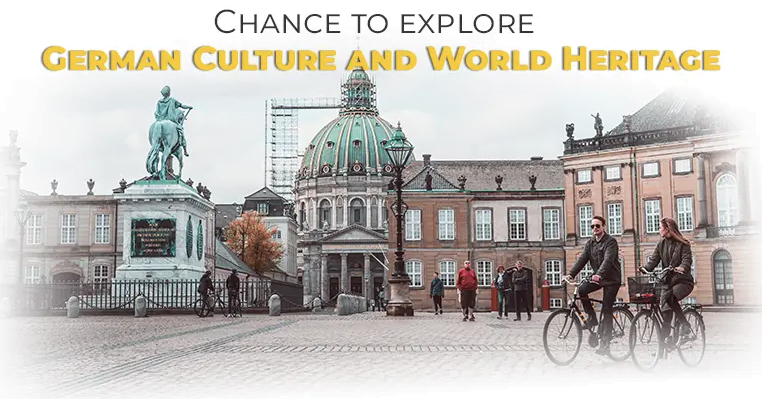The German language is not just a means of communication; it’s a gateway to a rich cultural heritage. At the Indian School of Languages, we believe that understanding the interplay between language, arts, and history is crucial in mastering German. This article delves deep into how the German language intertwines with its vibrant culture and history.
The Essence of German Language and Culture
The German language serves as a key to unlocking centuries of artistic and historical treasures. From the philosophical works of Kant to the symphonies of Beethoven, German has been the medium for some of the world’s most profound cultural contributions.
The Historical Journey of the German Language
The Roots of German
Tracing back to the Holy Roman Empire, the German language has evolved significantly. It’s essential to understand these historical contexts to grasp the nuances of the language.
Influence of Major Historical Events
Events like the Reformation and the unification of Germany under Bismarck have shaped the German language, infusing it with unique expressions and terminologies.
German Language and Literature
Classical and Modern German Literature
German literature, from the works of Goethe and Schiller to modern writers like Franz Kafka and Thomas Mann, offers a window into the German psyche and societal evolution.
Poetry and Prose
Exploring German poetry and prose gives insights into the rhythm, tone, and emotional depth of the language.
Music and the German Language
Classical Music
Germany’s contribution to classical music is unparalleled. Comprehending German allows one to appreciate the works of composers like Bach and Wagner in their original form.
Contemporary Music Scene
Modern German music, spanning genres like rock, pop, and electronic, continues to influence the global music scene. Understanding the lyrics can deepen the appreciation for these works.
German Language in Visual Arts
From Renaissance to Modern Art
German art history, from Albrecht Dürer to Gerhard Richter, demonstrates the evolution of artistic expression in tandem with linguistic shifts.
Film and Media
German cinema, known for its unique storytelling and aesthetic, offers a rich resource for language learners. Films from the Weimar era to contemporary cinema are not just entertainment but cultural lessons.
The Interplay of Language and Philosophy
German Philosophers
German is the language of philosophers like Hegel, Nietzsche, and Heidegger. Understanding their original texts can be a transformative experience.
Linguistic Nuance in Philosophy
Philosophical texts are dense and complex, presenting an opportunity to engage deeply with the language and its expressive potential.
Architecture and the German Vernacular
Historical and Modern Architecture
From Gothic cathedrals to Bauhaus designs, German architecture reflects the nation’s history and cultural shifts. Learning architectural terms enhances language skills and cultural understanding.
Language Learning Through Cultural Immersion
Cultural Festivals and Events
Participation in German cultural festivals, both locally and in German-speaking countries, can significantly enhance language proficiency.
Museums and Historical Sites
Visiting museums and historical sites, physically or virtually, can provide contextual learning experiences.
The Role of Technology in Cultural Language Learning
Language Learning Apps and Online Resources
Leveraging technology for language
learning can be effective. Apps and websites offering German courses often integrate cultural aspects into their curriculum.
Virtual Tours and Online Exhibitions
Explore German museums, historical sites, and art galleries online. These virtual experiences can enrich your understanding of the language in a cultural context.
Practical Tips for Integrating Culture into Language Learning
Engaging with German Media
Regularly consuming German media, such as newspapers, television shows, and podcasts, provides exposure to contemporary language usage and cultural themes.
Language Exchange Programs
Participate in language exchange programs with native German speakers. These interactions allow for practical language practice and cultural exchange.
Writing and Artistic Expression
Try expressing yourself in German through creative writing or art. This encourages a deeper engagement with the language and cultural concepts.
The Educational Approach at Indian School of Languages
Our Curriculum
Our curriculum is designed not just to teach German as a language but as a cultural journey. We incorporate historical, artistic, and contemporary cultural elements into our language courses.
Expert Faculty
Our faculty comprises not only language experts but also individuals with a deep understanding of German culture, history, and arts.
Interactive Learning Experiences
We provide interactive experiences such as cultural workshops, guest lectures, and field trips to German-themed events or exhibitions.
Preparing for Cultural Immersion
Language Proficiency and Cultural Sensitivity
We emphasize building language proficiency alongside cultural sensitivity, preparing students for immersive experiences in German-speaking environments.
Study Abroad Programs
For those interested, we offer guidance and support for study abroad programs in German-speaking countries, enhancing language skills through real-world exposure.
Conclusion
Mastering the German language is more than learning grammar and vocabulary; it’s an exploration of a rich cultural tapestry. At the Indian School of Languages, we strive to provide an immersive learning experience that bridges language and cultural understanding.
Embark on this fascinating journey with us and unlock the cultural treasures of the German-speaking world!

